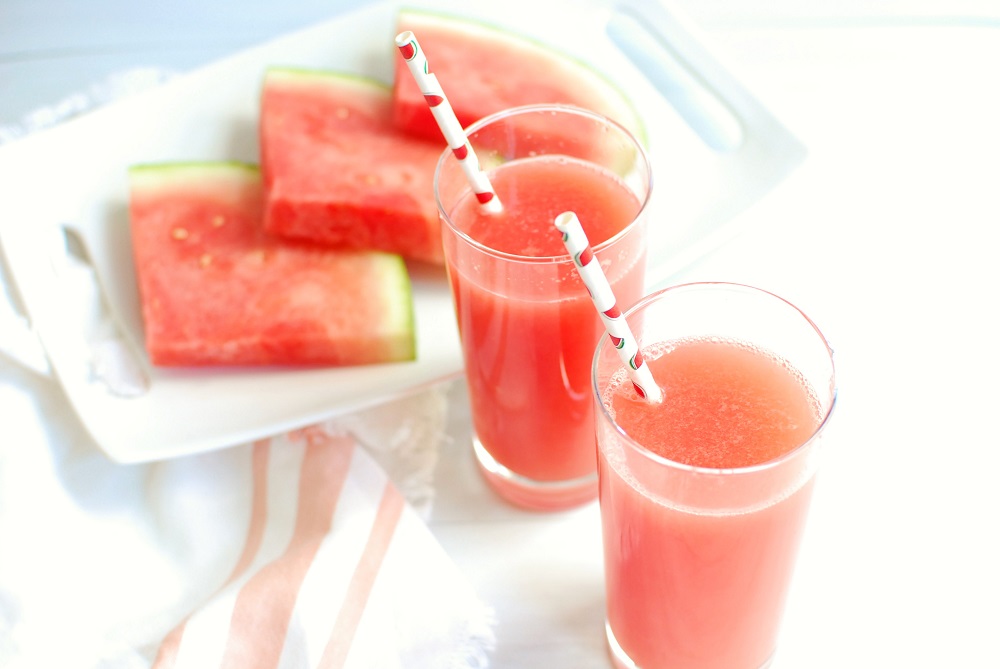
 By Guest Blogger Chrissy Carroll, MPH, RD, LDN, ACSM-cPT, USAT Level I Triathlon Coach, RRCA Certified Running Coach
By Guest Blogger Chrissy Carroll, MPH, RD, LDN, ACSM-cPT, USAT Level I Triathlon Coach, RRCA Certified Running Coach
You know that watermelon is sweet, juicy, and refreshing – but did you also know that it’s good for your body? This sweet treat deserves a spot in your kitchen year-round thanks to its taste and nutrition. From hydration to Vitamin C and everything in between, check out five reasons to eat more watermelon:
1. Helps you hydrate.
Every part of your body needs water to work properly, so it’s important to stay hydrated. While sipping from your water bottle regularly is essential, you can also meet some of your hydration needs through fluid-rich foods. At 92 percent water by weight, watermelon is a delicious way for you to hydrate, whether fresh, juiced, or blended in a smoothie.
2. Part of a balanced diet for weight management.
Fruit – especially watermelon – is often called out for its sugar content, with some people claiming it will lead to weight gain. While it’s true that you should avoid excess added sugar, the naturally occurring sugar in fruit comes packaged with many nutrients and is typically not linked to weight gain.
On the contrary, the CDC suggests that using more fruits and vegetables is a healthy way to help with weight management. Because watermelon is a high-volume food with just 80 calories in two cups, it can help fill you up at meals.
3. Provides Vitamin C.
Vitamin C helps support immune health, functions as an antioxidant in the body, and is involved in the formation of collagen.
Watermelon provides Vitamin C to help you meet your daily needs. In fact, two cups provide 25 percent of the daily value. Mix other good sources into your diet too – like citrus fruits, strawberries, bell peppers, and white potatoes – and you’ll be on your way to meeting your daily target.
4. Supplies lycopene.
Lycopene is a powerful plant carotenoid. A true lycopene leader, watermelon contains 12.7 mg per 2-cup serving – more than any other fresh fruit or vegetable commonly eaten in the United States.
Fat in your meals helps increase lycopene absorption¹, so try one of these tasty recipes that combine watermelon with healthy fats:
- Enjoy a balanced lunch with a watermelon Greek salad, which contains ingredients like olives, olive oil, and feta.
- Get creative at dinner with roasted salmon with watermelon salsa, providing nutritious omega-3 fatty acids in the fish.
- Dig into a watermelon dessert board, complete with cashews and almonds to provide healthy fats.
5. Contributes carbs to fuel your workouts.
Carbohydrates are the body’s preferred source of fuel during intense exercise. If you’re active (and we all should be!), it’s important to eat a balanced diet that provides enough carbohydrates to support your activities.
Watermelon provides 21 grams (8% DV) natural carbohydrates to fuel your fitness, along with health-promoting vitamins, minerals, and phytochemicals. Consider…
- Eating watermelon as part of a pre-workout snack to provide carbohydrates to support your upcoming sweat session.
- Juicing watermelon to drink for hydration and fuel during a long endurance workout (just add a pinch of salt to help replace the sodium you lose when sweating).
- Eating watermelon after a tough workout to help restock your muscles with glycogen (the carbohydrates that are stored as energy in the muscles). Don’t forget to add in a good post-workout protein source too!
The Final Word
Any way you slice it, watermelon is a nutrient-dense food that you can feel confident stocking in your kitchen. For creative ways to prepare and cook watermelon, be sure to check out these tasty recipes.

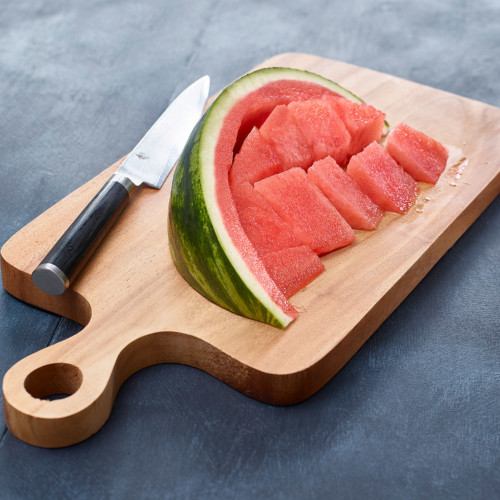
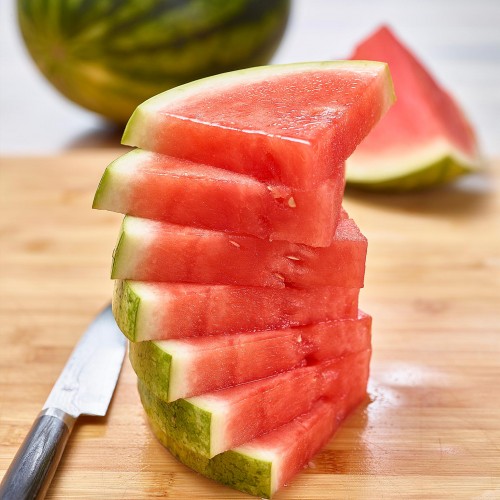
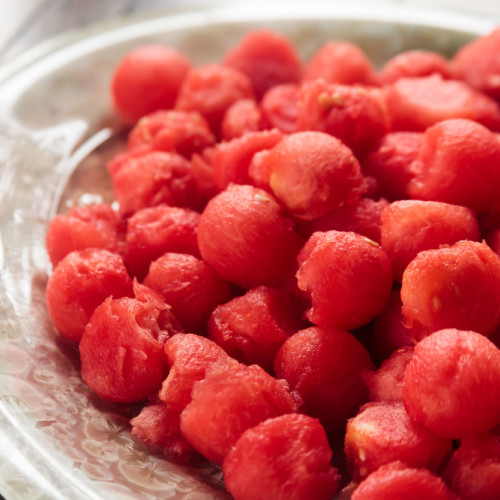
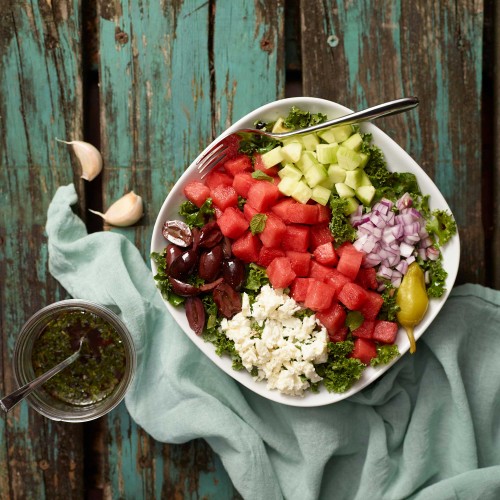
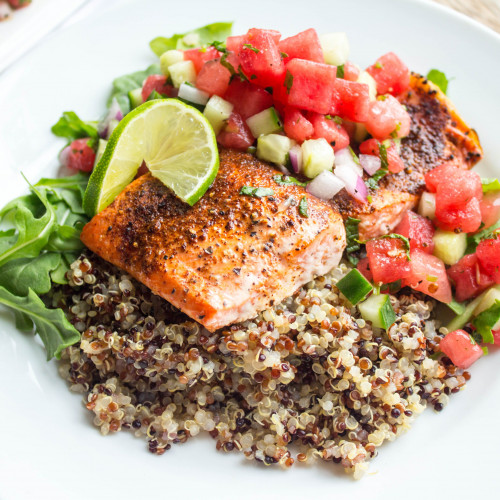

Comments
I’d love to see what special variety of watermelon actually exists on a
monthly year around basis – in accordance to that particular month?
A sweet watermelon available in December – January or February?
Interesting idea! Did you know there are over 1200 varieties of watermelon grown worldwide? At any given time here in the USA there might be 50 varieties in the market, and they might change each year as new varieties are developed by seed breeders (by crossbreeding techniques). Typically what we as consumers see at the grocery store are “types” and not the actual seed varieties, meaning watermelons are labeled as seedless, seeded, mini, yellow, orange or fresh cuts. Hopefully all watermelon hits the super sweet factor every month of the year!
Literally love watermelon. Keep up the good work lads
Please tell me how do i freeze it?
You’ll want to cut the watermelon up first, into chunks. Spread those out on a parchment-lined baking sheet and place in the freezer. At 92%, they will freeze into nice cubes! Transfer those to an airtight Ziplock bag or container and keep frozen until ready to use.
I watermelon every month. Freeze and make smoothie year round or just eat it fresh.
ME Love WATERMELON!!!!!!!!!!!!!!!!!!!!!!!!!!!